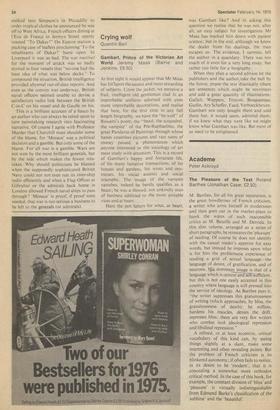Academe
Peter Ackroyd
The Pleasure of the Text Roland Barthes (Jonathan Cape. £2.50) M. Barthes, for all his great reputation, is the great bowdleriser of French criticism, a writer who arms himself in modernism and then goes out in the market-place to hawk the wares of such inaccessible critics as M. Bataille and M. Derrida. In this slim volume, arranged as a series of short paragraphs, he reinstates the 'pleasure' of reading. Of course he does not identify with the casual reader's appetite for easy words, but instead he imposes upon what is for him the problematic experience of reading a grid of sexual language--the language of desire, of gratification, and of neurosis. Ilis. dominant image is that of a language which is central atirsirf=kifficient, but this is not one easily accepted in this country where language is still pressed into the service of ideology. As Barthes puts it, "the writer suppresses this gratuitousness of writing (which approaches, by bliss, the gratuitousness of death): he stiffens, hardens his muscles, denies the drift, represses bliss: there are very few writers who combat both ideological repression and libidinal repression."
A refined, or at least eccentric, critical vocabulary of this kind can, by seeing things slightly at a slant, make some interesting and often revealing points. But the problem of French criticism is its blinkered autonomy; if often fails to notice, in its desire to be 'modern', that it is concealing a somewhat more orthodox critical method. In the case of this book, for example, the constant division of 'bliss' and 'pleasure' is virtually indistinguishable from Edmund Burke's classification of the sublime' and the 'beautiful'.


































 Previous page
Previous page